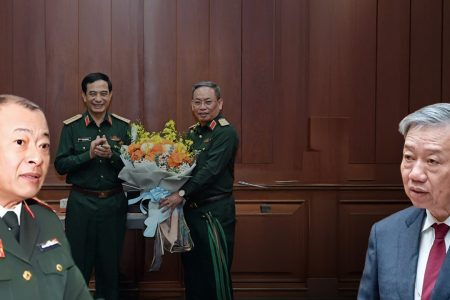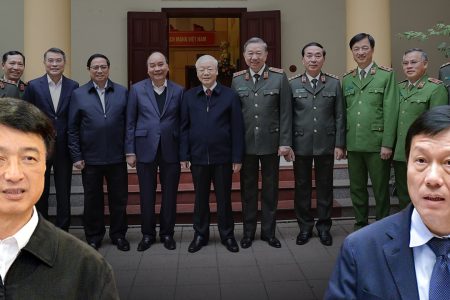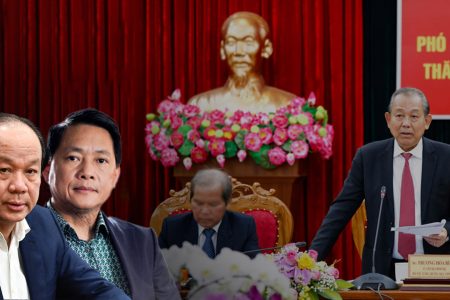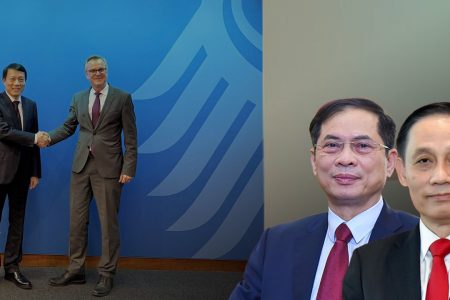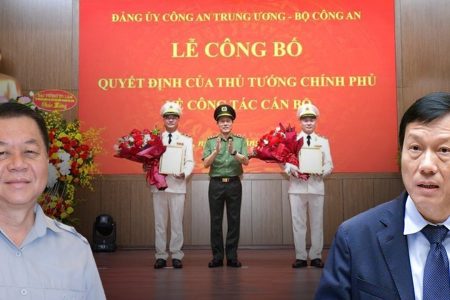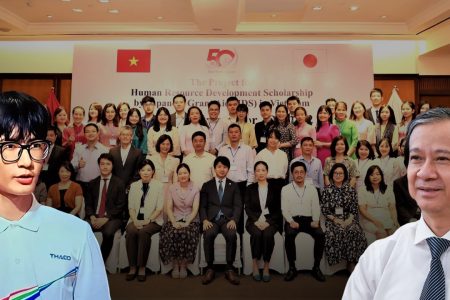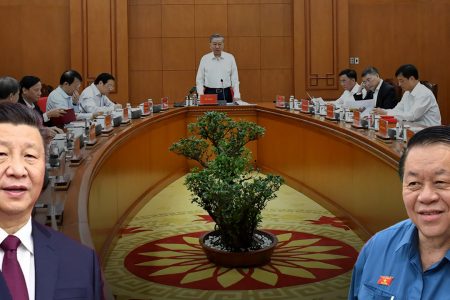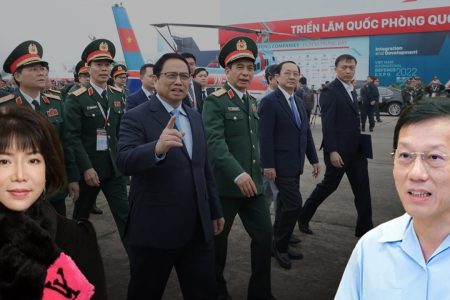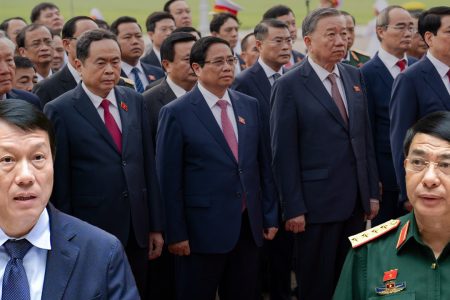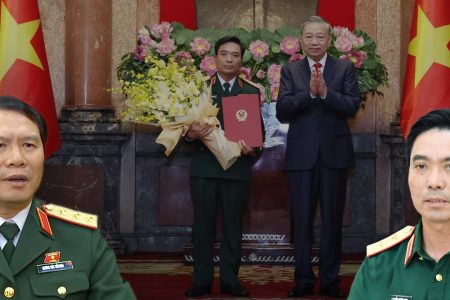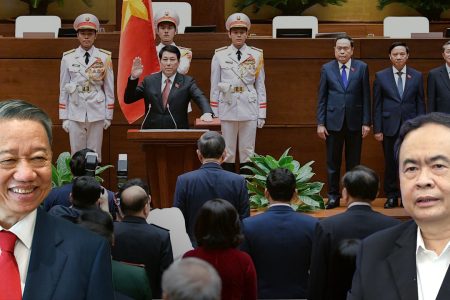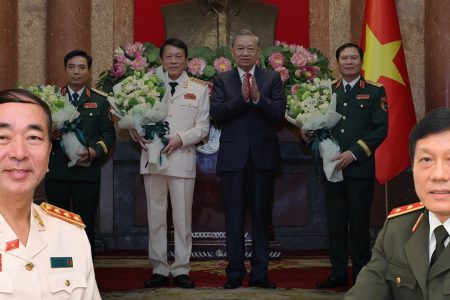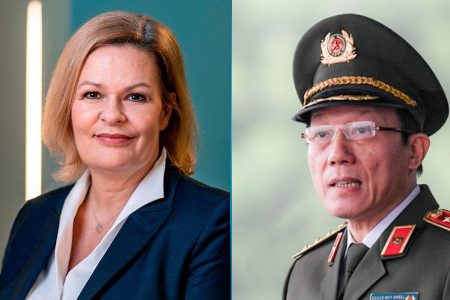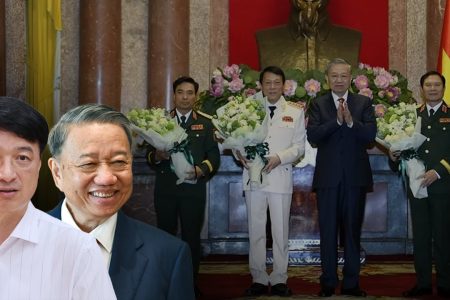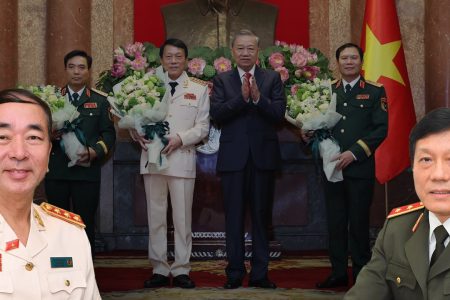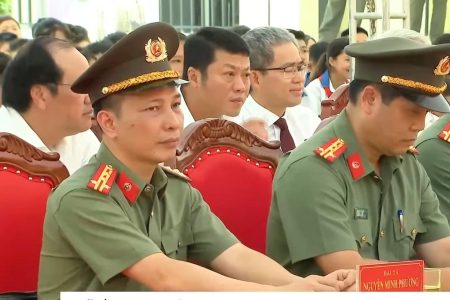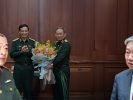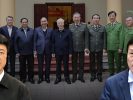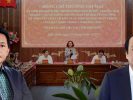Cambodia’s Ministry of Foreign Affairs has just summoned Vietnamese Ambassador to Cambodia Vu Quang Minh in connection with the ongoing dispute in an undemarcated border area between the two countries, close to Vietnam’s border with An Giang province and the Cambodian province of Kandal.
The news site Cambodianess.com reported that the Ministry of Foreign Affairs of Cambodia on June 2 requested Ambassador Vu Quang Minh to its office to hand over its request asking Vietnam to withdraw its soldiers and dismantle tents that had been set up near the Cambodian border.
The Cambodian Foreign Ministry said there are still a number of Vietnamese tents inside the Kandal border area. The Ministry of Foreign Affairs said on June 1, Secretary of State Eath Sophea summoned Ambassador Minh to discuss the issue.
The Khmer Times newspaper quoted the statement of State Secretary Eath Sophea:
“We have asked Vietnam to dismantle all those tents as soon as possible, and continue to maintain the status quo in the region until the border committees of the two countries finish resolving the delimitation borders in that area.”
Cambodia said Vietnamese soldiers earlier this month had set up 31 tents in Kandal province. At a press conference at the Council of Ministers, Governor of Kandal Kong Sophorn province said on May 28 that Vietnam had removed 9 out of 31 camping tents at the border areas.
Earlier on May 13, Cambodia sent diplomatic notes to Vietnam for tents erected by Vietnam in two districts of Kandal province, but the tents were removed before the Vietnamese government provided official response.
Vietnam has confirmed that the construction of tents close to the border is not malicious but aims to prevent COVID-19 epidemic. The Vietnamese side said the camps were built on Vietnamese soil, but it was an area where the two sides had not reached a demarcation agreement, according to VNA.
Cambodia and Vietnam share a common border of 1,270 km. In recent years, the two sides have promoted the demarcation and have approved 86% of the common border. Vietnam has affirmed that setting up tents does not affect the delimitation of the border between the two countries.
In 2014, protests against Vietnam’s policies on land in the southern region where many Khmer Krom came from began in early July with the participation of hundreds of people after Tran Van. Thong, the political counselor of the Vietnamese Embassy in Phnom Penh, stated that the land that the Khmer Krom called Cambodia Krom, the Mekong region in Vietnam, belongs to Vietnam for many generations.
Tran Mannrinh, a representative of the Khmer Krom Khmer Federation in the US, said: “This is a huge misunderstanding issue. Vietnam has no solution to the problem that Mr. Tran Van Thong has said, causing discontent for many people. Vietnam does not pay enough attention, properly investigates how it works, but today the Vietnamese government keeps ignoring it, so the anger of the people is increasing.”
Meanwhile, Cambodian Khmer Federation President Krom Thach Ngoc Thach told VOA Vietnamese Language via email that “no one can change the past” and “Vietnam must respect history.”
During Saturday’s protest, Mr Thach urged Cambodians to boycott Vietnamese goods if the Vietnamese diplomat ignored their request.
Hanoi has not officially spoken out about the latest anti-Vietnamese protest in Cambodia, but previously the Vietnamese Foreign Ministry spokesman “vehemently objected to the Khmer extremists Kampuchea Krom in organizing illegal demonstration and burning Vietnam’s flag in Phnom Penh.”
Mr. Le Hai Binh also said that this action was “intentionally seriously offending the sentiments of the Vietnamese people, not in accordance with the good traditional friendship and friendship between Vietnam and Cambodia.”

In August 2014, when welcoming Cambodian National Assembly Chairman Samdech Heng Samrin, then Vietnamese Prime Minister Nguyen Tan Dung asked the Phnom Penh government “not to allow anti-Vietnam protests in which protesters burn Vietnam’s flag which he considered “causing emotional hurt of the Vietnamese people.”
The COVID-19 pandemic originating from China has driven Western countries to seek thei ways to reduce economic independence from China. With such a powerful corona virus, this trend also spreads to the so-called Chinese allies in Southeast Asia, Cambodia and the Philippines. The two countries have taken steps to show their desire to reduce their dependence on China and raise their vigilance.
Speaking at the groundbreaking ceremony of a coastal project in Sihanoukville province on June 1, Cambodian Prime Minister Hun Sen denied that Ream’s military port allows only Chinese warships to dock and affirmed Phnom Penh welcomes warships from all countries come there, including the US.
According to the Cambodian leader, recently some foreign diplomats, including the US, have expressed concern about Phnom Penh over the information that Cambodia only favors Chinese warships to visit its strategic port located towards the Gulf of Thailand.
And Hun Sen asserted, “If one country’s warship is docked at Ream, the other countries can do that. We don’t close the port to any other country.”
Hun Sen said that the Cambodian Constitution does not allow foreign military bases to be set up in his country but warships visits by all countries are welcome.
According to the Associated Press, the Cambodian leader said that Beijing does not need to set up bases in his country because there are other bases in the East Sea (South China Sea), referring to the illegal artificial entities that China has built.
At the same event, Hun Sen said Cambodia was ready to attend joint exercises with all countries. However, this is only done after the COVID-19 pandemic has passed.
A day after the statement, the Cambodian Prime Minister’s Office released a statement stressing Phnom Penh that it “will not ally with one country against another.”
Cambodia’s Prime Minister’s June 2 statement stated: “Recalling the Cambodian position again to avoid any suspicion regarding the Ream port, Cambodia has not allied with one country against another nor allow foreign military presence on Cambodian territory. We are not sending our army in any other countries, except under the UN flag. “
Less than a year ago, Hun Sen also denied that Cambodia leased Ream military to China for 30 years after the US Wall Street Journal quoted information from anonymous officials of the country and its allies saying Beijing and Phnom Penh earlier this year secretly signed an agreement giving China exclusive rights to use part of Cambodia’s Ream naval base in the Gulf of Thailand.
Cambodian Prime Minister Hun Sen said on July 22, 2019: “This is an unprecedentedly horrific fabrication of information aimed at Cambodia. That is not possible because the establishment of a foreign base on the territory is against the Cambodian Constitution.”
The Ream base is operated by the Cambodian navy in Sihanoukville province in southwestern Thailand, located on the coast bordering the Gulf of Thailand.

The US and Cambodian military have conducted a number of joint exercises here before bilateral defense relations became cold, as Phnom Penh moved closer to Beijing.
Since 2016, Cambodia indefinitely conducted joint exercises with the US and by August 2017 relations between Cambodia and the US became strained after Phnom Penh accused Washington of meddling in internal affairs of country.
Instead, relations between Cambodia and China have become increasingly close. On March 15, despite the COVID-19 pandemic, nearly 3,000 Cambodian soldiers began the Golden Dragon exercise with China. This is the fourth Golden Dragon exercise between Cambodia and China. Earlier, Cambodian Defense Minister Tea Banh and Chinese ambassador to Cambodia Wang Wentian had affirmed they would not postpone the Golden Dragon exercise 2020 despite the outbreak of COVID-19. The announcement was made at the handover ceremony of Cambodian COVID-19 protective equipment to China’s Ministry of National Defense.
China has been the largest donor to Cambodia in recent years. In addition to military aid, Beijing in 2017 provided Phnom Penh with $11 million to organize local elections. The concentrated infrastructure projects in Phnom Penh and the port city of Sihanoukville have made the land of pagodas completely change the face quickly.
In return for hefty investments from China, Cambodia has given China its vote and voice by supporting Beijing’s geopolitical stance at international forums on issues such as claims. China’s territorial sovereignty in the South China Sea.
Many analysts believe that setting up a base in Cambodia will allow China to expand its military strategy significantly, and tilt the balance of power in the region in a way that will put pressure on neighboring countries in theASEAN which tend to side with the US more.
Thoibao.de (Translated)



